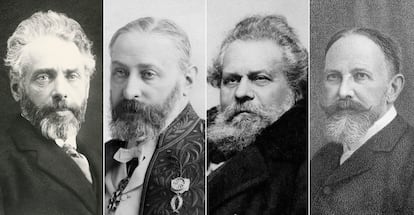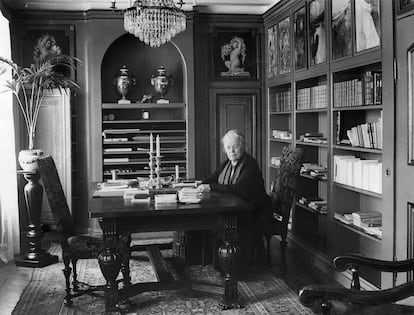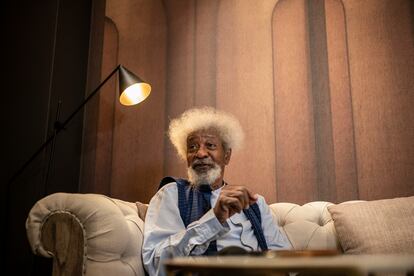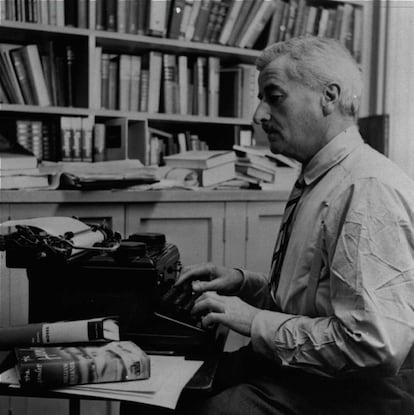The Nobel Prize in Literature’s history of snubs and long-forgotten winners
Shaped by the political and literary climate of the time, the award does not assure a spot in the literary canon and often overlooks exceptional authors


Mostly people would say that winning the Nobel Prize in Literature is a great honor. But a closer look at the history of the award might change their minds. Several publishers offer collections of works by Nobel Prize winners. Some people like to decorate their living rooms with unread books with gold-embossed leather covers. Open one up, and you may find something by Albert Camus, Gabriel García Márquez, William Faulkner, Samuel Beckett or Yasunari Kawabata — the Mount Olympus of the literary gods.
But in those elegant tomes of Nobel laureates, you may find some unfamiliar names, even if you are a well-read bibliophile. How about Sully Prudhomme, the French poet and essayist who won the first Nobel Prize for Literature in 1901? Or Verner von Heidenstam (1916), Frans Eemil Sillanpää (1939) and Johannes Vilhelm Jensen (1944)? Do you know about Giosuè Carducci (1906), Henrik Pontoppidan (1917) or Carl Spitteler (1919)?
Some deserving writers have followers and readers in their home countries but never achieve international recognition or a Nobel Prize. Some of their works remain untranslated, while others have not seen updated editions in years. Winning the Nobel Prize, the highest international literary honor, doesn’t ensure future recognition or the immortality sought by aspiring writers.
The Nobel Prize eras
One possible reason for all the forgotten Nobel laureates is the evolution of the Nobel Prize over time, says professor Juan Bravo, who wrote a book about Nobel Prize winners for literature. Until a few years after the World War I, he says the prize was very regional. “At times, the Nobel Prize academy is influenced by diplomatic criteria, shall we say. A glance at the first 20 Nobel laureates reveals mostly low-profile names, with a few exceptions like Kipling (1907), Tagore (1913) and possibly Selma Lagerlöf (1909).”

Moreover, the further back we go in the list of winners, the more we find unfamiliar names. Time has sifted and settled the layer of dust, slowly erasing their memory. “Each era has its own particular interests. Many books that used to be bestsellers have been relegated to the back shelf,” said Cristina Oñoro, a literature professor at the Complutense University of Madrid.
A gradual period of openness started in 1920, but after World War II, Bravo says the Nobel Prize for Literature became more introverted, especially after Jean-Paul Sartre’s abrupt rejection of his award in 1964. In 1990, a period of “globalization” began with Mexican author Octavio Paz’s win. “This doesn’t mean that there haven’t been periods of regression, like the one we’re currently experiencing,” said Bravo.
During this globalization, we first encountered authors from different corners of the world. These writers are often unknown because they hail from distant lands, not because of their lack of skill or time-tested relevance. The awards to Wole Soyinka of Nigeria (1986), Gao Xingjian (2000) and Mo Yan (2012) of China, and Abdulrazak Gurnah (2021) of Tanzania perplexed the literary community and made cultural journalists scramble to find out more. In the 20th century, 80% of the Nobel laureates in literature were citizens of the U.S., Canada or Europe, while Africa, Asia, and the rest of the Americas accounted for the remaining 20%. Interestingly, no individual born in Oceania has ever received the Nobel Prize for Literature. However, a noticeable shift is now taking place.

The Nobel Prizes introduced new names and expanded the literary horizons of Western societies, challenging their ethnocentrism. In recent decades, female winners have become more common, as 93% of the winners were male until 1990 — typically older, white European men. While Europeans and Americans still dominate, they have only won 66% of the awards in the last 15 years. However, there is no guarantee that these diverse winners won’t also fade into literary obscurity, like many of their predecessors. “I think some of the recent Nobel Prize winners might end up being completely forgotten in the future. Who even reads Soyinka, Louise Glück, or Szymborska nowadays, apart from some book clubs?” wonders Javier Aparicio Maydeu, a professor of Spanish and comparative literature at Pompeu Fabra University in Spain.
Once the annual awards are revealed, the inevitable debates ignite, fueling heated discussions and opinions. “I think they should validate the career of an author who has already proven their worth, like Mario Vargas Llosa,” said Aparicio. “The prizes being given now, you know, to discover new talents, I don’t think they align with Alfred Nobel’s original intentions.” Others say the presence of lesser-known names adds depth and variety. “Literature is a vehicle for sharing voices and cultures, so I think it’s positive that the Nobel Prize can serve to broaden our horizons,” said Oñoro.
Spanish winners
The Spanish winners of the Nobel Prize for Literature tell the same story. While Juan Ramón Jiménez (1956) is highly regarded, Vicente Aleixandre (1977) is an excellent representative of the Generation of ‘27, and Camilo José Cela (1989) still casts a long shadow, others like José Echegaray (1904) and Jacinto Benavente (1922) are not widely known or read anymore. Surprisingly, the prestigious award was never bestowed upon their contemporaries, Benito Pérez Galdós and Ramón Valle-Inclán.
While some award-winning authors have been forgotten by readers, other deserving writers have simply been overlooked by the Swedish Academy. Among them are living authors like Haruki Murakami (who won Spain’s Princess of Asturias award this year) and António Lobo Antunes. There was no Nobel for revered authors like James Joyce, Vladimir Nabokov, Philip Roth and Javier Marías. “Marías had all the qualities to win a Nobel Prize — a great body of work translated into multiple languages, and you can even find pocket editions of his books in bookstores when you travel abroad,” said Aparicio.

Many authors have left a lasting legacy without winning a Nobel, which proves that it is far from being the ultimate literary authority. “In no way,” said Bravo. “I’ll give you just one example. The canon of the 20th century novel has five names: Proust, Joyce, Kafka, Faulkner, and Virginia Woolf. Well, the only one who received the award was Faulkner, in 1949.”
Studying the impact of the Nobel Prize for Literature enables us to understand the mechanisms of literary fame and other types of celebrity. It does not ensure transcendence and lasting recognition. Authors may rise to prominence in one era, only to be forgotten in another. Conversely, forgotten authors can be rediscovered, while canonical figures in one country may be insignificant elsewhere. Success is fleeting, memento mori.
Sign up for our weekly newsletter to get more English-language news coverage from EL PAÍS USA Edition
Tu suscripción se está usando en otro dispositivo
¿Quieres añadir otro usuario a tu suscripción?
Si continúas leyendo en este dispositivo, no se podrá leer en el otro.
FlechaTu suscripción se está usando en otro dispositivo y solo puedes acceder a EL PAÍS desde un dispositivo a la vez.
Si quieres compartir tu cuenta, cambia tu suscripción a la modalidad Premium, así podrás añadir otro usuario. Cada uno accederá con su propia cuenta de email, lo que os permitirá personalizar vuestra experiencia en EL PAÍS.
¿Tienes una suscripción de empresa? Accede aquí para contratar más cuentas.
En el caso de no saber quién está usando tu cuenta, te recomendamos cambiar tu contraseña aquí.
Si decides continuar compartiendo tu cuenta, este mensaje se mostrará en tu dispositivo y en el de la otra persona que está usando tu cuenta de forma indefinida, afectando a tu experiencia de lectura. Puedes consultar aquí los términos y condiciones de la suscripción digital.








































